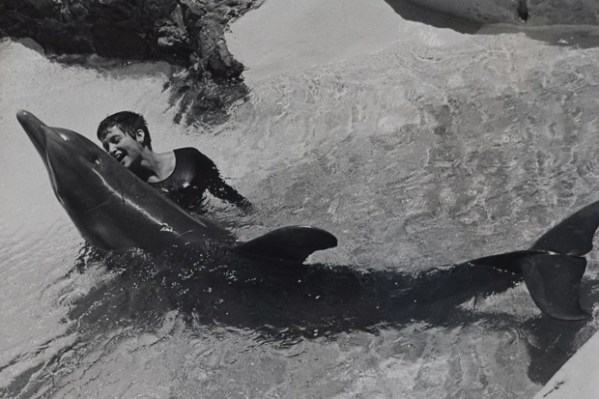There was little reason to be curious about David or Jackie Siegel at the beginning of Queen of Versailles (Monday, BBC4): he is the King of Timeshare and she is his Beauty Queen; they are building a palace in Florida, and modelling it on Versailles; it will be the biggest private home in America, when it is finished, and the Siegels will squeeze into it with their colossal fortune, their fleet of staff, their eight children and their bouquet of powder-puff dogs. ‘My husband deserves this house,’ says Jackie. ‘It’ll be like a lifetime achievement.’ There didn’t seem a whole lot more to find out.
But then, after 30 minutes of screen time, came the crash: September 2008. Siegel’s fortune dissolved, credit became debt, income was slashed and employees were sent home. ‘Versailles’ — the incomplete fantasy — was put on hold.
Lauren Greenfield’s camera, however, was permitted to keep rolling and the Siegels’ losses became the film’s rather slippery gains: slings and arrows, swings and roundabouts, tragedy, comedy, pomp and absurdity, the mighty and the ridiculous, the awkward and (if you’ll pardon my bug-eyed voyeurism) the awfully compelling.
The family remained in a 26,000 sq.ft temporary home. Staff were fewer and chaos lapped at the threshold. Standards began to slip: dog shit lay uncollected on the carpets and the lizard died of starvation. Jackie — a natural homemaker and a warm-hearted person, with or without the gazillion dollars — was distressed, and confronted her children: ‘You guys killed him!’
‘I apologise for being a horrible person,’ responded one child.
‘I didn’t know we had a lizard,’ said another.
Siegel sat on his sofa, crotchety and rumpled — he looked as empty and purposeless as a dropped sock. He was angry with his family (‘When they shut off the lights, you’ll all appreciate electricity!’) and obsessed with recovering his wealth. ‘I’m on a quest,’ he said grimly. He dreamed of a yacht, and of living alone. ‘Just you and me,’ he promised one of the dogs, ‘in that big house.’
If Queen of Versailles had been fiction we would not have believed it, but documentaries can tell incredible truths without calling for heroes or villains. The Siegels are as human as the rest of us, and while their circumstances were peculiar their behaviour — footling about at home in their dressing-gowns — was ordinary. Our access to that ordinariness was total; that unguardedness — their openness — was their saving grace: the more we saw in close-up, the less able we were to judge. The film captured a portrait of the particular — those two people, at that time and in that place — but it contained a reflection of everyone.
Some people will consider an hour alone with Jonathan Meades, in Essex or anywhere else, to be a chore, but not me: I fell for The Joy of Essex (Tuesday, BBC4). I enjoyed being lectured, I clucked fondly over Essex without her make-up, I delighted in her curious, expressive and intimate history and I admired the fact that Meades did not consult one single other human being from the programme’s start to its finish. (It is quite unusual to find a television programme, let alone a whole county, so unpopulated.)
Frustrated individuals, tired of London and tired of English society, have long been taking themselves off to Essex in order to cultivate their own utopias in their own backyards. Social experimentation, artistic experimentalism, mindful retreat and spiritual regeneration (with or without physical deprivation) have all been sown and nurtured in Essex; young, clean modernism was accommodated in the privacy of Essex; chuntering religious types have wrung their hands and rung their bells in Essex; and model villages have been built, populated and abandoned on Essex’s sandy shores. Meades, who likes nothing better than to be the only oddball in the frame, reminded us that we are all a bunch of muddling, curious oddballs and that the ingenious fakery of a modern reality TV series — The Only Way Is Essex — represents a poor substitute for the authentic pottiness of the camping grounds, coteries and communes of Essex’s past.
Doing his best to look and sound dour, Meades crackled with the gleeful fury that is his trademark. He relished every queer sort, rum do or meddlesome nuisance that turned up in the narrative, and he hurried us from place to place at a brisk, incautious trot. (He did, happily, take time to poke his stick down any nearby holes: ‘accessibility means nothing more than being understandable to morons’; Cheshire is ‘another county besmirched by footballers’, etc.) Essex looked beautiful — a crisp, clean photography distinguished the whole programme — and music, used with a rare and careful sympathy, was allowed to speak its own part. (The one stumbling block was that ‘radio DJ’ voiceover: pointless and annoying.)
I decided not to be snitty this week — it’s an experiment — and so I am not going to review Professor Brian Cox’s new film, It’s a Wonderful Life. Oh, sorry: I meant Wonders of Life (Sunday, BBC2). Oops — there I go again.






Comments